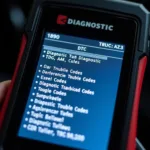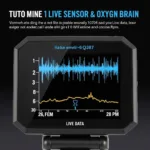The car diagnostic world is constantly evolving, transforming how we identify and resolve vehicle issues. From simple code readers to advanced diagnostic software and tools, understanding this landscape is crucial for both car owners and professionals. This article delves into the complexities of car diagnostics, exploring the latest technologies, trends, and essential knowledge needed to navigate this intricate field. You’ll gain valuable insights into the tools, techniques, and expertise required for effective vehicle diagnostics. After reading this, you should have a clearer picture of this ever-changing technical world.
Understanding the Importance of Car Diagnostics
Modern vehicles are complex machines controlled by sophisticated computer systems. When something goes wrong, pinpointing the issue often requires specialized diagnostic tools and knowledge. Car diagnostics involve using electronic devices to communicate with the vehicle’s onboard computer, retrieve diagnostic trouble codes (DTCs), and analyze sensor data. This process enables technicians to identify the root cause of problems efficiently and accurately. For car owners, understanding basic car diagnostics can empower them to make informed decisions about repairs and maintenance. As vehicles become increasingly complex, the car computer diagnostic app is changing everything.
Effective car diagnostics can save both time and money by quickly identifying issues, preventing unnecessary repairs, and ensuring optimal vehicle performance. Whether you’re a DIY enthusiast or a seasoned mechanic, having a grasp of car diagnostic principles is essential in today’s automotive landscape. It allows for a more targeted approach to troubleshooting, minimizing guesswork and reducing repair costs.
Exploring the Different Types of Car Diagnostic Tools
The car diagnostic world offers a vast array of tools, ranging from basic code readers to high-end professional scanners. Understanding the different types of tools and their capabilities is crucial for choosing the right one for your needs. Basic OBD-II scanners are portable devices that can read and clear DTCs, providing basic information about the problem. More advanced scan tools offer additional features such as live data streaming, actuator tests, and special functions. Professional-grade diagnostic platforms provide comprehensive diagnostics, programming capabilities, and access to extensive vehicle information databases. For those seeking the best, researching the most expensive car diagnostic tool can provide valuable insights.
Choosing the right car diagnostic tool depends on factors such as the level of diagnostics required, the makes and models of vehicles you work with, and your budget. Basic code readers are suitable for DIY enthusiasts who want to check for simple problems. Professional mechanics, on the other hand, often require more advanced tools with comprehensive capabilities. Considering the source and quality is also important, especially with the increasing prevalence of tools from regions like China, leading many to research options such as the car diagnostic scanner china.
The Role of the Car Diagnostic Technician
The car diagnostic technician plays a critical role in the car diagnostic world. Their expertise lies in interpreting diagnostic data, diagnosing complex vehicle issues, and performing necessary repairs. They are skilled in using various diagnostic tools, understanding vehicle systems, and applying their knowledge to effectively troubleshoot problems. Car diagnostic technicians often specialize in specific areas such as engine diagnostics, transmission diagnostics, or electrical system diagnostics. Their ability to accurately diagnose and repair vehicle issues is essential for ensuring vehicle safety and reliability.
“A skilled car diagnostic technician is like a detective,” says John Smith, Senior Automotive Engineer at AutoTech Solutions. “They meticulously analyze data, follow clues, and use their expertise to solve the mystery of vehicle malfunctions.” This highlights the importance of experience and knowledge in the car diagnostic world. Becoming a proficient car diagnostic technician requires ongoing training and keeping up with the latest advancements in automotive technology. This knowledge is also essential when looking at international resources, for instance, a diagnostic world car.
The Future of Car Diagnostics
The car diagnostic world is rapidly evolving, with new technologies and trends constantly emerging. The increasing complexity of vehicle systems and the rise of connected cars are driving innovation in the field. Remote diagnostics, predictive maintenance, and cloud-based diagnostic platforms are transforming how we diagnose and repair vehicles. Artificial intelligence and machine learning are also playing a growing role, enabling more accurate and efficient diagnostics.
Conclusion
The car diagnostic world is an intricate and dynamic landscape that requires constant learning and adaptation. Understanding the various tools, techniques, and expertise involved is crucial for both car owners and professionals. By staying abreast of the latest trends and advancements, we can effectively navigate this complex field and ensure the efficient and accurate diagnosis and repair of vehicle issues. The car diagnostic world is only becoming more important.
FAQ
-
What is OBD-II?
OBD-II stands for On-Board Diagnostics, Generation Two. It’s a standardized system that allows external diagnostic tools to communicate with a vehicle’s computer. -
What are DTCs?
DTCs are Diagnostic Trouble Codes. These are codes stored in the vehicle’s computer that indicate a specific problem. -
What is live data streaming?
Live data streaming allows you to view real-time sensor data from the vehicle, providing valuable insights into its operation. -
What are actuator tests?
Actuator tests allow you to command various components of the vehicle, such as fuel injectors or solenoids, to test their functionality. -
How often should I perform car diagnostics?
It’s recommended to perform basic diagnostics periodically, or whenever you suspect a problem with your vehicle. -
What qualifications do car diagnostic technicians need?
Car diagnostic technicians typically require specialized training and certifications, along with a strong understanding of automotive systems. -
What is the difference between a code reader and a scan tool?
A code reader can retrieve and clear basic DTCs, while a scan tool offers more advanced features like live data streaming and actuator tests.
Further Questions and Resources
For those seeking more information, we encourage you to explore additional resources on DiagFixPro. Consider researching related topics such as the differences between various diagnostic software or exploring the benefits of specialized diagnostic equipment.
Don’t hesitate to contact us for support via WhatsApp: +1(641)206-8880, or Email: [email protected]. Our customer service team is available 24/7.

